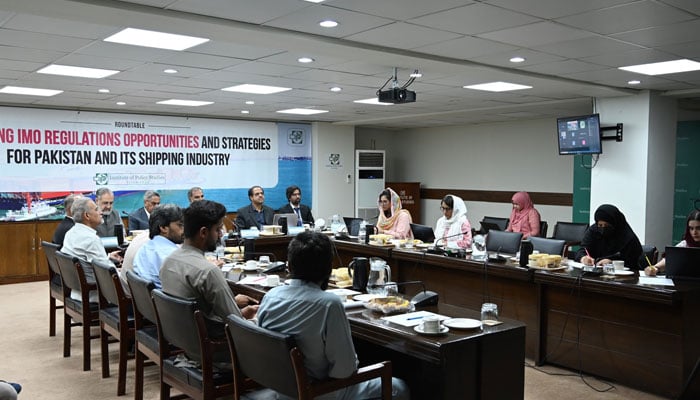Call for regulatory harmonisation, IMO compliance to unlock maritime potential
Islamabad:As Pakistan seeks to align itself with evolving global maritime standards, there is an urgent need for structural modernisation, regulatory harmonisation and sustained compliance with International Maritime Organisation (IMO) regulations, said experts during a roundtable session on Thursday.
They called for cohesive legal reforms, inter-ministerial coordination, and greater private-sector engagement to position the country as a competitive and sustainable maritime nation. The event titled ‘Navigating IMO Regulations: Opportunities and Strategies for Pakistan’s Shipping Industry’ was organised by the Institute of Policy Studies (IPS) here to mark the World Oceans Day.
IPS chairman Khalid Rahman said policy consistency and regulatory predictability were crucial for building investor confidence, attracting long-term investment and sustaining meaningful reform.
He also underscored the importance of involving the private sector in policymaking to ensure a smooth and effective maritime transition. Adviser to the Ministry of Maritime Affairs Cdre (r) Jawad Akhtar outlined Pakistan’s recent maritime achievements and its progress toward aligning with IMO standards, emphasising the potential to expand maritime trade to over $100 billion through structural modernisation and regulatory reforms.
He highlighted the revival plan for the Gadani ship-breaking yard, which generated revenue of $6 billion last year, down from $21 billion in 2020-21, saying it is not in full compliance with the Hong Kong Convention.
Key developments include Pakistan’s first unified fishing policy, approval for PNSC to acquire four IMO-compliant ships, accession to the Hong Kong Convention, and legal reforms for key port and shipping ordinances.
Akhtar stressed the need for gradual but sustained IMO compliance and addressed outdated laws, lack of engagement, and data reporting gaps. He advocated for a harmonised approach involving think tanks, inter-ministerial coordination, updated legal frameworks, and full accession to pending IMO conventions to ensure sustainable maritime growth.
Director (legal) at the Ministry of Maritime Affairs Shahzad Atta pointed out significant legal ambiguities and institutional disconnects that complicate enforcement and hinder investment in green shipping infrastructure. He emphasised the political and constitutional complexities introduced by the 18th Amendment, noting that the federal government cannot override provincial jurisdiction without proper consultation.
Atta said international conventions didn't address internal divisions of responsibility, complicating their domestication. Maritime strategist and consultant Cdre (r) Irfan Taj advocated for treating PNSC as a commercial entity, revitalising seafarer development and modernising port infrastructure to support green fuels.
He proposed privatising port operations, fostering international partnerships and establishing a national carbon credit framework. Member of the National Climate Change Council Ali Tauqeer Sheikh noted that a climate-smart maritime sector was not only an environmental necessity but also an economic imperative. He advocated for public-private partnerships and digitisation as essential for fostering innovation, efficiency, and green investment in the port and shipping sectors.
-
 Snow Forecast Warns Of Reduced Visibility And Travel Risks In Ontario
Snow Forecast Warns Of Reduced Visibility And Travel Risks In Ontario -
 Margot Robbie Reveals 'worst' Gift She Received From Co-star
Margot Robbie Reveals 'worst' Gift She Received From Co-star -
 Casey Wasserman Says He ‘deeply Regrets’ Ghislaine Maxwell Emails After DOJ File Release
Casey Wasserman Says He ‘deeply Regrets’ Ghislaine Maxwell Emails After DOJ File Release -
 Discord Face Scan Age Verification Rules Explained As Platform Tightens Access
Discord Face Scan Age Verification Rules Explained As Platform Tightens Access -
 Cavaliers Vs Nuggets Showdown Heats Up After Blockbuster Trade
Cavaliers Vs Nuggets Showdown Heats Up After Blockbuster Trade -
 Where Kelsea Ballerini, Chase Stokes Stand After Second Breakup
Where Kelsea Ballerini, Chase Stokes Stand After Second Breakup -
 Thunder Vs Lakers: LeBron James Playing As Lakers Miss Luka Dončić
Thunder Vs Lakers: LeBron James Playing As Lakers Miss Luka Dončić -
 Pistons Vs Hornets Recap: Brawl Erupts With 4 Players Getting Tossed Before Detroit Victory
Pistons Vs Hornets Recap: Brawl Erupts With 4 Players Getting Tossed Before Detroit Victory -
 Gordie Howe Bridge Faces Uncertainty After Trump Warning To Canada
Gordie Howe Bridge Faces Uncertainty After Trump Warning To Canada -
 Air Canada’s Flights To Cuba Halted As As Aviation Fuel Crisis Worsens
Air Canada’s Flights To Cuba Halted As As Aviation Fuel Crisis Worsens -
 Marc Anthony Weighs In On Beckham Family Rift
Marc Anthony Weighs In On Beckham Family Rift -
 New Guest Host Announced For The Kelly Clarkson Show
New Guest Host Announced For The Kelly Clarkson Show -
 Why Prince William’s Statement Over Jeffrey Epstein ‘says A Lot’
Why Prince William’s Statement Over Jeffrey Epstein ‘says A Lot’ -
 Paul McCrane Reveals Why Playing Jerks Became His Calling Card
Paul McCrane Reveals Why Playing Jerks Became His Calling Card -
 Prince William, Kate Middleton Thrashed For Their ‘bland’ Epstein Statement
Prince William, Kate Middleton Thrashed For Their ‘bland’ Epstein Statement -
 Bad Bunny Stunned Jennifer Grey So Much She Named Dog After Him
Bad Bunny Stunned Jennifer Grey So Much She Named Dog After Him




